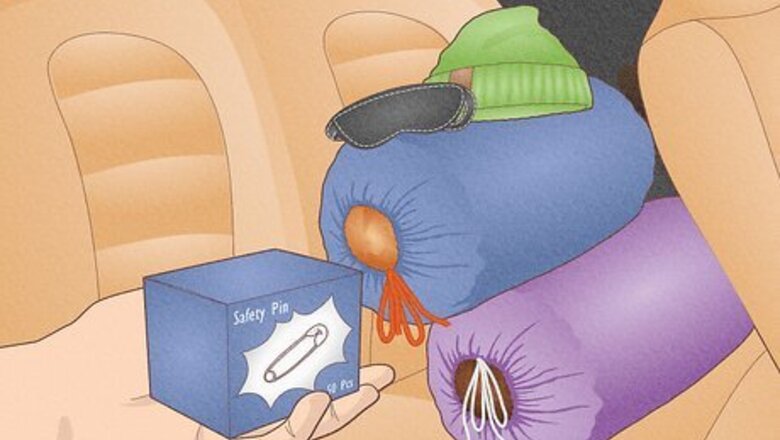
views
Preparing for the Night

For cold temperatures, buy a sleeping bag (or two). What you need for a good night's sleep in the car depends on your location, the weather, and what sort of temperatures you are acclimated to. In subzero temperatures, you will probably benefit from a couple of sleeping bags (one inside the other), in addition to a blanket and a beanie for your head. A $60 sleeping bag will keep you warm in −20 °F (−29 °C) weather outside. In a car, you can get by with a −20 °F (−29 °C) sleeping bag. If it gets colder, then just add an extra layer of clothing to your sleeping attire. Bring a safety pin with you to keep your sleeping bag closed if it does not draw tightly around your head. If you toss and turn in the middle of the night, it could come undone and you could wind up awake and freezing. A knit hat (knit cap, toque, ski hat, and so on) will keep you much warmer at night. Also, you can pull it over your eyes for additional darkness. A sleep mask can help you sleep more soundly. In a pinch, you can blindfold yourself with a bandanna, tie a scarf around your eyes, use a hat, and so forth. Otherwise, you may find yourself up at the crack of dawn, as it is hard to darken a car completely. No sleeping bag? Two blankets pinned together with safety pins are the next best thing. Or even sleeping under a pile of blankets.

For hot temperatures, let in the air and keep out insects. A thin cloth (like a sheet or even a towel) hung in the windows keeps bugs out and lets air in. The weather is the most important thing to consider when in this situation. Hot weather can actually be worse than cold, as you could wake up in the morning feeling sticky, gross, and covered in mosquito bites. Try opening the windows just an inch or so to find a happy medium. You can also buy mesh to place in your windows (or sunroof). Wire mesh can be scavenged from an old screen window or door, or screening can be bought at a hardware store. Be careful of very hot temperatures in cars. Cars can heat up very quickly, and if you are in a very hot climate, such as a desert, this can be a real hazard. If you become overcome with heat, you may not wake up and realize you are close to dangerous dehydration and/or heat exhaustion.

Gather supplies for a comfortable night. Try to think ahead, especially if you plan on spending more than one or two nights in your car. It will likely get dark out, and harder to find what you need before bedding down for the night. This likely means: Water Flashlight Pillow (or pillow-like object), blanket or sleeping bag. Cell phone: for emergencies, for a wake-up alarm, or a game to play. Book: A little reading can make a dull night more pleasant. Coffee can with lid (for men and women with excellent aim) in case you have to pee, it may be easier to do so with a coffee can than get up in the cold or bug-filled outdoors. Hand sanitizer or baby wipes. Clean your hands before eating or after using the bathroom or any time hygiene is in doubt. Since you may have irregular access to running water, these toiletries can help prevent you from illness and keep you looking and smelling presentable. If you are in the car with others or with cargo, you will likely be sleeping sitting up. Sleeping in the car seat is not exactly the best place to sleep, but if you have to, use a travel pillow that supports your head and neck. You will wake up in the morning much happier.
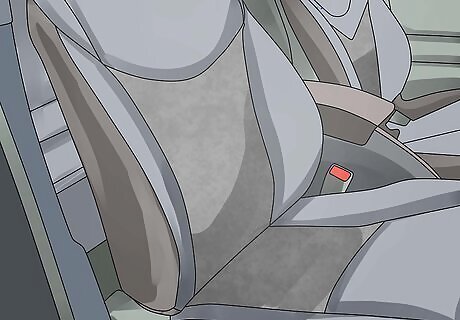
Keep your car clean. A tidy car makes it easier to find things, especially at night. A clean car is a pleasure to sleep in and even a few inches often makes a great difference in your comfort. Also, if it is dirty and smelly, it will be much more difficult to fall asleep. Keep only the essentials out, like a flashlight, water, a backpack for one set of clothes (unless you are traveling), and a towel. A cleaner car also attracts less attention, especially if clean on the outside. Few people will think to ask questions of a car that looks presentable. A filthy car filled with trash and bags looks suspicious. Avoid clutter by putting things away during the day. While you do not absolutely have to roll up your sleeping bag in the back seat or fold your towel, it will look tidier from the outside and thus less suspicious. This is especially important if you are trying to not be obvious about sleeping in your car.

Consider getting a tarp. Tarps are inexpensive, usually easy to find, and will keep prying eyes away. A tarp can help cut down on sunlight while often also allow for ample ventilation. Tarps on cars can look suspicious. Most people do not cover a car with a tarp, so this can point out a person sleeping in a car. In some places, this can be a problem, as described below.
Choosing the Perfect Spot

Find somewhere that you will not get ticketed. Unfortunately, sleeping in your car is illegal in many places, and even if not technically illegal will often be judged suspicious by the locals. Here are a few ideas: Stores like Walmart, movie theaters or 24 hour gyms. It is hard to tell who is sleeping in their cars and who is just parked while shopping, watching a film or working out. The downside is that people will also be constantly in the area-- although this can be a form of security as well.. Also, many of these 24 hour stores also have bright lights on all night long. Churches and other sanctuary-like establishments. Very often these buildings are quiet most of the week. If someone finds you, hopefully they will be kind enough to just continue on their merry way. Backroads and under overpasses. These are low-volume areas where you may not be disturbed, but just make sure the area is actually quiet and remote. An apparently nearly deserted back road may actually be well-travelled by residents, who know who is supposed to be there and who is not. Also, rural roads may have trucks or farm equipment constantly moving through. Residential areas that allow street parking. In this situation, your car will often just blend in on the side of the road. Just do not stay for too long or your vehicle may appear suspicious. Keep in mind that some urban residential areas may require special parking stickers to park legally. Also, street lights may become a problem for good sleeping. Public overnight parking. If it is an overhead parking garage, park on a high floor so that noise from cars entering and exiting will not bother you. Make sure to check signs to make sure the time limit is long enough and the parking lot allows overnight parking.

Take into account what your spot will look like during the day as well as at nighttime, and weekday versus weekend. Many locations may be quiet and relatively safe one day, and not another. Example: An empty parking lot next to a soccer field. During the middle of Friday night, no one is around, there are portable toilets, and it is seemingly perfect, but the next morning, there are a ton of screaming 7-year-olds ready for Little League and their mothers and fathers are peering suspiciously in the direction of your car. Example: A quiet corner, not a person in sight, and it's dark enough to sleep. But when you awake the next morning you find that there are shady-looking individuals about who also like the isolation of the area.

Face your car in the right direction. Consider two things: Face your car in the direction where it would be most difficult for people to spy on you or look in the windows to see you there. Corners are good, too. Face your car in the direction you want for the morning. Face it east if you want to wake with the sun and west if you want to stay snoozing.
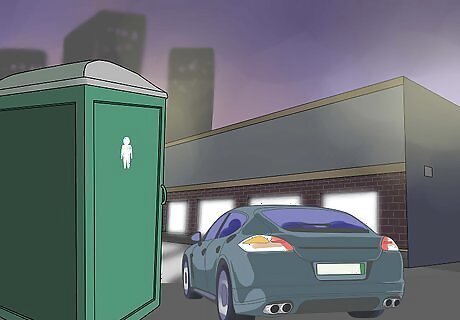
Pick somewhere with bathrooms (or equivalent) if possible. This is just good sense as you are likely going to have to use the bathroom at some point. If you can get easy access to a bathroom, you will have a better experience and keep more hygienic. Be careful of safety, however. Bathrooms that are unattended are also sometimes locations for crime. A bathroom that is in a 24 hour store or interstate rest stop is likely safer than a public bathroom in an urban park - but not always. Portable toilets are sometimes available at all hours. These are sometimes found at rest stops, construction sites, or parks. You can sometimes get away with using facilities (such as the pool or beachside bathroom and shower) of a campground, hotel, or the like if security is a bit lax, and you are sneaky. Gas stations usually offer public bathrooms. You can always urinate outside if you must, but this can result in a public urination citation in populated areas.
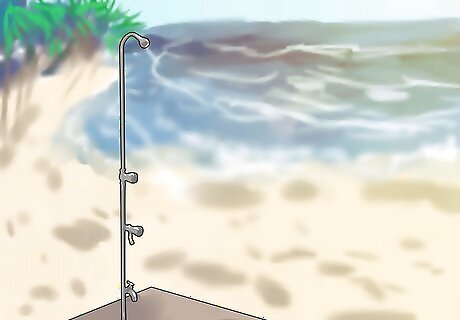
Take a bath once in a while. Showers and bathing may be tricky to find on the road, but not impossible. In many areas, public beaches have showers. Some truck stops have pay showers. While not free, they can be a great comfort on the road. A "solar shower" is easy to find in most camping equipment stores. It is a bag that heats up water during the day, that can be used to shower or wash dishes at night. While such a device still needs a way to hoist the bag up high, and get some privacy, it can give a good shower when there is no running water.
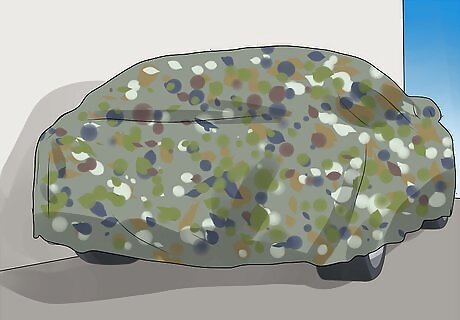
Consider camouflaging yourself. If you're worried you will be found, consider making it so your car can not really be seen. You can either do this with a tarp, by putting a whole bunch of goods in your car blocking you from view, or by sleeping underneath a pile of linens.
Getting Comfortable
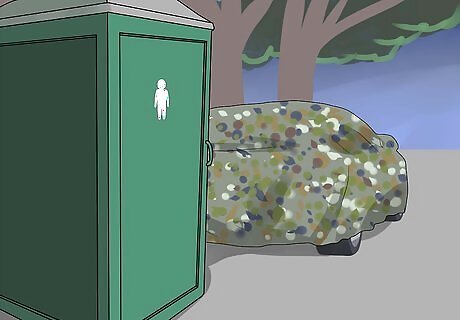
Make sure to visit the bathroom before you turn in. Park your car in your spot for the night, and make a visit to the bathroom beforehand.
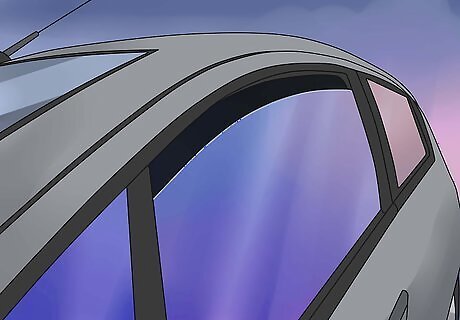
Consider cracking the windows. Again, this depends on the climate you are in. However, it is going to get stuffy regardless of the temperature (within reason, of course), so consider cracking the window slightly. If you are under a pile of blankets in the cold, it might actually feel good. Do not crack it too much, though, for security purposes. And if there are mosquitoes, crack it even less. A half an inch or less (1.25 cm) is plenty.
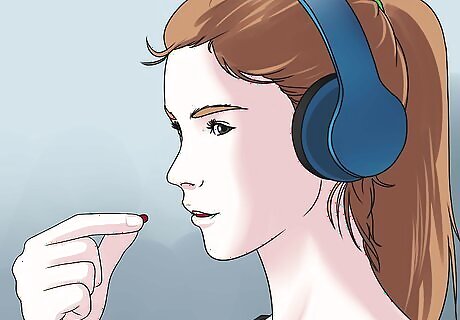
Take an anti-inflammatory, such as ibuprofen. If you have problems sleeping in less than perfect conditions or your body has a tendency to "wake up" achy, pop one before hitting the sack. It will be easier to fall asleep, easier to stay asleep, and you will feel less sore in the morning.
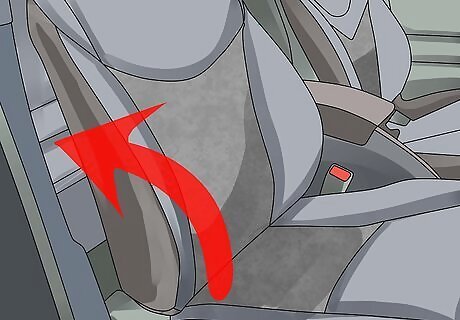
Adjust the seats. As much as possible, that is. If you are in the back seat, move the front seats forward to get the most space possible. Tuck in the seat belt clips so they do not end up jabbing you in the back. If the back seats turn down, do so. You could also pop open the back so you can put your legs (or head) in the trunk area.

Get into the appropriate amount of layers but stay in comfortable clothes. On the off chance someone comes knocking on your door, you want to be wearing clothes, and acceptable clothes at that. So get comfortable, but stay dressed. Workout clothes are best. This way you can also turn your bed into a getaway car at a moment's notice if need be. And account for the weather, too. If it is cold, make sure your head is covered to keep heat from escaping. If necessary, put on several layers. If it is hot, a t-shirt and shorts will do just fine. You could also wet them beforehand to stay cool.
Present Yourself Well

Keep in mind that your behavior and appearance will help determine how others will react to you. The community your car is parked in may react to your presence, and how you look and act may well determine how you are treated. If you are considered suspicious, you may find yourself harassed or even jailed if you are not careful.
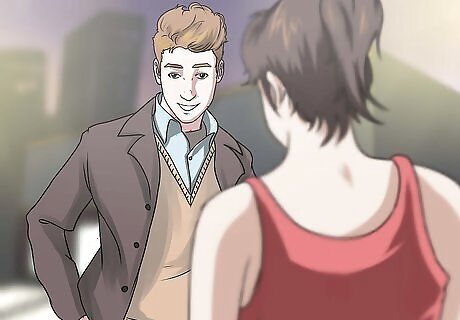
Be friendly. People tend to be less concerned about strangers when they are friendly. Say hello to people, be polite, and a little confident chit-chat can go a long way to reassuring the locals. In general, keep to yourself. Drawing too much attention to yourself is usually not a great idea. Car camping is often technically illegal, so you do not need to spotlight yourself. If you have a particularly charismatic and outgoing personality, you may find yourself able to use your abilities to your advantage. You can find out information, ask favors, maybe even find a friend. But, of course, be careful as not every friendly stranger is safe.

Look respectable. If you are dirty, scruffy, and dressed like a stereotypical "bum", this may draw the attention of the locals. Try to keep clean, dress in an unassuming manner, and look as though you are a respectable individual.
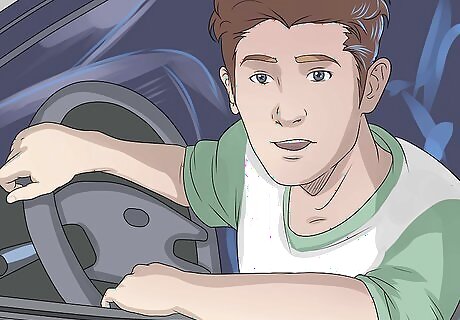
Have a good story - even if it may not be true. If confronted by authorities, such as a police officer, store manager, park ranger, or concerned citizen, it is good to have a simple story about why you are there that is believable and not scary. It could well be true, or it may not be, depending on your situation. For example: "My deepest apologies, I'm on my way to a rally in Washington, D.C. I feel very strongly about protecting the environment, you see. I don't have money for a hotel, so I was planning to sleep here for the night. I'm sorry if I worried you. I'll move right along." "I'm very sorry, I just lost my home and have nowhere to sleep until I get to my parents' home." "Sorry, sir. I pulled off of the road because I was falling asleep at the wheel. I've been driving for 10 hours. I'm OK, just wanted to be safe." "I'm sorry, officer - I'm getting away from an abusive relationship. I'm on my way to my sister's house in Alberta. I don't have any money for a hotel but I just had to get away from there as soon as I could." Be nice and polite to the police. Law enforcement officers may be there to enforce vagrancy laws, but they also really want to help people in need, too. Very often, they will offer help, leave you in peace, or at least let you be on your way without further trouble. Do not treat every police officer as your enemy; they are often helpful. But do not depend on the local constable to be on your side, as not everyone will be. It is better to not get the attention of the police in the first place.




















Comments
0 comment